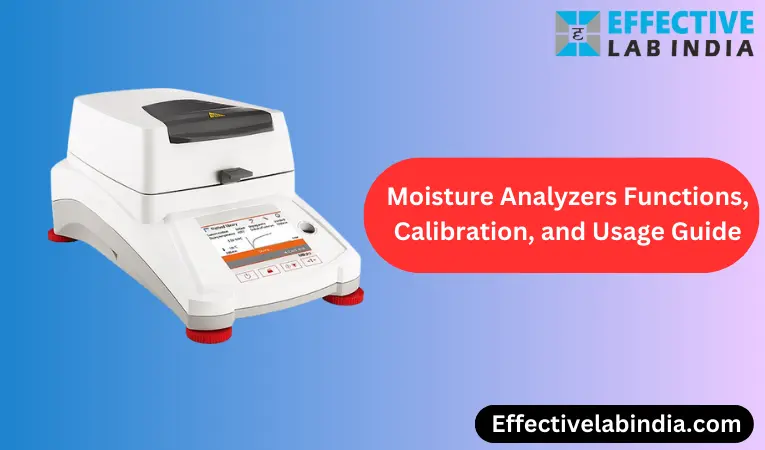Moisture analysers are precise machines that measure weight changes when materials are heated to detect the amount of moisture present in them. The basic operations of moisture analyzers functions, such as their capacity to yield precise measurements of the moisture content in a variety of samples, are covered in this guide. Along with useful usage advice for best results, it also covers the necessary steps for calibrating the device to guarantee accuracy. This handbook helps users use moisture analysers efficiently to get consistent and dependable findings, whether for research, manufacturing operations, or quality control.
What is a moisture analyzer?
It is an instrument used for testing the moisture content in laboratory materials. This instrument is equipped with advanced technology which measures accurate moisture present in a sample.
Determining the moisture in samples is beneficial for quality control, research and development purposes that’s why it is analyzed with the help of a moisture analyzer.
Moreover, it has importance in chemicals, food processing, and pharmaceutical industries. This instrument maintains the consistency of products by analyzing moisture content and it optimizes the production process.
Moreover, it can also prevent potential damages that can occur due to moisture such as spoilage, degradation and inefficient formulation.
How to use a moisture analyzer?
A moisture analyzer works based on the thermogravimetric principle. In this machine, the sample is heated after monitoring weight loss. It is measured continuously until it reaches the moisture-free state.
Moreover, this machine has three components which are; a heating unit, a weighing balance and a temperature control system. It also has a moisture sensor which comes with the latest technology of infrared, capacitance and halogen.
These components work together in a moisture analyzer to provide accurate moisture content present in the sample.
The results obtained from the moisture analyzer are utilized for quality control and documentation.
How to calibrate the moisture analyzer?
A moisture analyzer is calibrated by following these steps.
- Prepare the analyzer by making it clean of any contaminants.
- Calibrate the balance of the analyzer by following the standards.
- If the analyzer comes with a function of temperature control. Then calibrate it by using a thermometer.
- For calibrating moisture content, use the instructions provided by your analyzer manufacturers.
- After completing calibration, verify its accuracy.
Moreover, always read the instructions given in the user manual of your moisture analyzer.
How to use moisture analyzer mb-40 citizen brand?
If you are holding an MB-40 citizen moisture analyser and don’t know how to use it, then these steps surely help you.
- Prepare the sample and power on the analyzer.
- Set parameters by using a screen and the samples should be placed onto the sample pan.
- Now start the measurements and wait for the results.
- After analyzing the sample, record the result.
- After all the processes, clean the analyzer and pan and then turn it off.
What is a moisture analyzer used for?
A moisture analyzer is used in different industries for a range of purposes.
It has uses in cosmetics, chemicals and pharmaceuticals. The amount of moisture content in the products is determined with the help of this instrument. This measurement is helpful in research, product development and quality control.
It is also used for determining the moisture contents in raw materials, solids, liquids pastes etc.
It is also used for analyzing the moisture in cheese, grains, seeds and adhesives.
Which type of moisture analyzer is best?
If we talk about the best moisture analyzer type then it would be a halogen moisture analyzer. It is best because it provides rapid heating rather than other analyzers.
The appropriate moisture analyser for you must depend on your unique requirements. High-precision moisture analysers from Effective Lab India are available in halogen and ultraviolet varieties. Halogen moisture analysers are perfect for regular laboratory testing because they provide fast, precise, and highly repeatable results. Excellent sensitivity and consistency are provided by infrared analysers for more specialised applications. The best moisture analyser for your needs will depend on the type of sample you have, the quantity of accuracy you need, and your budget.

